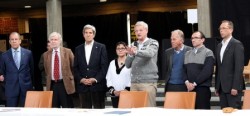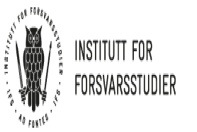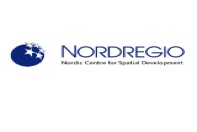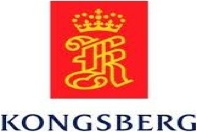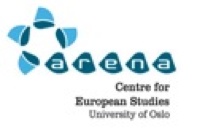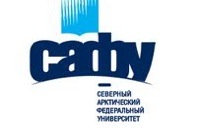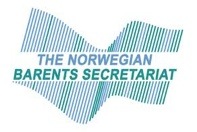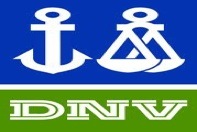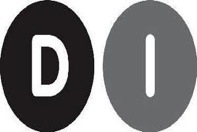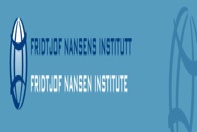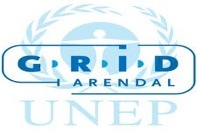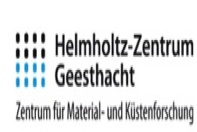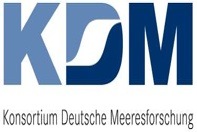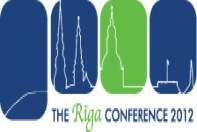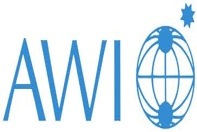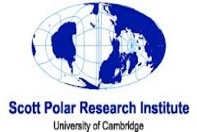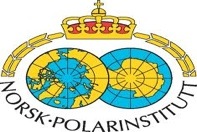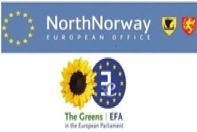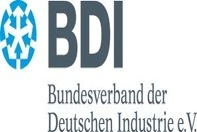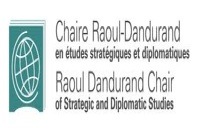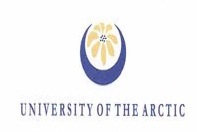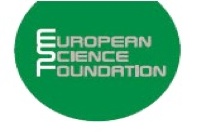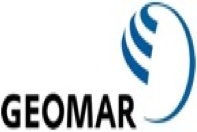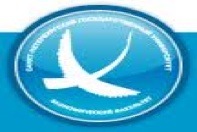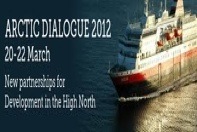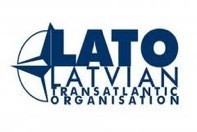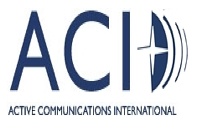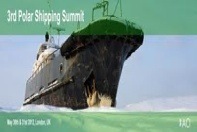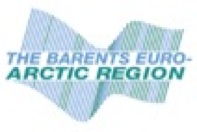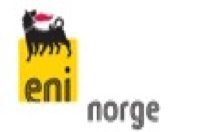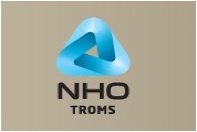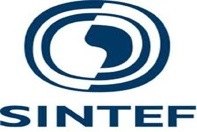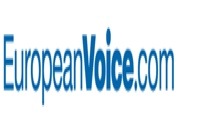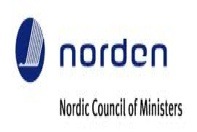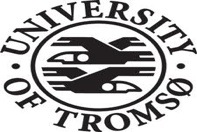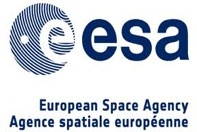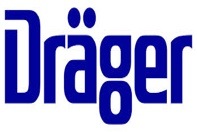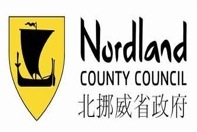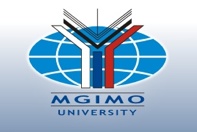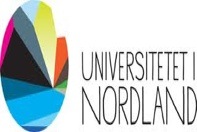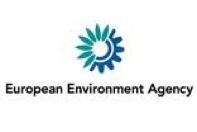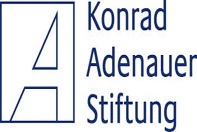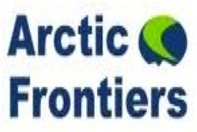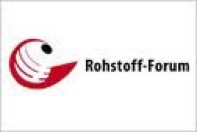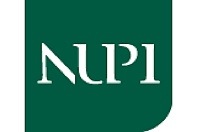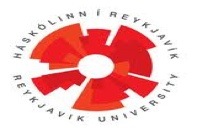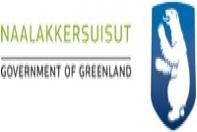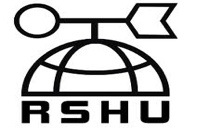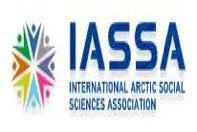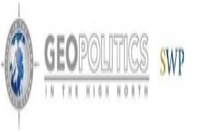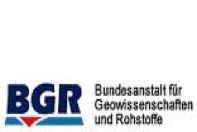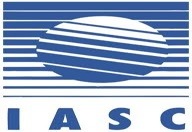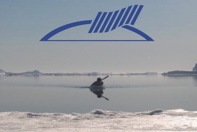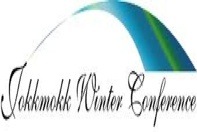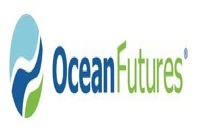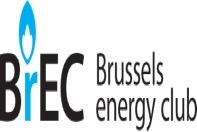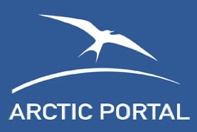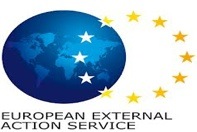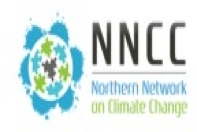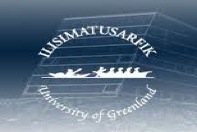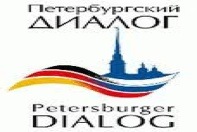Arctic Council Kiruna Ministerial Meeting: Strengthened role of the Arctic Council in a globalized Arctic – China in, the EU on hold
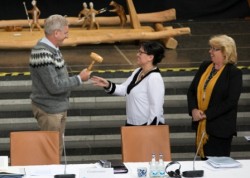
The Swedish Minister for Foreign Affairs, Carl Bildt hands over the chairmanship of the Arctic Council to Leona Aglukkaq, Minister for the Arctic Council, Canada. Photo: Martina Huber/ Swedish Government Offices
On the 15th May 2013, the 8th Ministerial Meeting of the Arctic Council was held in Kiruna where Sweden handed the Chairmanship to Canada until 2015. At a time when the Arctic is changing at a fast pace, this Ministerial meeting echoed and amplified the main challenges faced by the region in terms of the issues featuring on its existing economic and geo-political agenda, as well as new issues raised on the occasion of the Meeting. The Declaration sets out four priorities: improving economic and social conditions, acting on climate change, protecting the Arctic environment and strengthening the Arctic Council.
An economic agenda
The objective of Canada to promote economic development during its chairmanship of the Arctic Council, an objective that has been promoted for the past year and a half by its Minister for the Arctic Council, Leona Aglukkaq, appears as the first objective to be highlighted in the Declaration of the Arctic Council: “improving economic and social conditions”. The institution recognizes the “central role of business” in the development of the region. The Declaration announces the establishment of a Task Force to facilitate the creation of a circumpolar business forum. It also underlines the need to identify opportunities for the development of complementary infrastructure, seaports and airports in particular.
As for social conditions, associated to economic development in the Declaration, Ministers have acknowledged the challenges experienced by Arctic people faced with rapid socio-economic and environmental changes, and they have taken the decision to undertake further work “to improve and develop strategies for the promotion of mental wellbeing”. Indeed, the physical and mental health and wellbeing of Indigenous Peoples and residents were the priorities of the Arctic Council under the Danish Chairmanship. The Council also decided in Kiruna to “develop recommendations to integrate traditional and local knowledge in the work of the Arctic Council”. Since education is the key dimension for ensuring that the human resources are available to both administrate and manage the development of economic activities in the North, as well as to provide the necessary skilled labor, one might wonder if the importance of the issue of education in achieving the important objective of “development for the North” might not also have been worth giving specific prominence in that perspective.
Acting on Climate Change
This objective looks daunting and indeed the U.S. Secretary of State John Kerry warned that it will take “courage” to tackle climate change. “When the threat of climate change is as ominous as ever, its effects are as tangible as ever, and the courage — literally, the courage — that we summon in the coming months and years is as crucial as ever. This is one of the most obvious shared challenges facing the planet today,” the U.S. Secretary of State told the Arctic Council Ministerial Session.
Amongst other recommendations, the Arctic Council urges all Parties to the United Nations Framework Convention on Climate Change to continue to take urgent action to meet the long-term goal aimed at limiting the increase in global average temperatures to below 2 degrees Celsius above pre-industrial levels.
The Arctic Resilience Report, a priority of the Swedish Chairmanship, which was part of an international cooperative venture led by the Stockholm Environment Institute (SEI) and the Stockholm Resilience Centre at Stockholm University (SRC), was released during the Kiruna Meeting. Annika E. Nilsson, scientific coordinator of the project, says that “change this rapid is unprecedented” and that “we have to be prepared for surprises, and we need to increase our capacity to adapt and to grapple with conflicting priorities”. The document includes evaluation of various strategies for communities and governments to adopt.
Protecting the environment and scientific cooperation
Many assessments and reports have been produced to tackle the issue of environmental protection: the above-mentioned Arctic Resilience Report; the Arctic Biodiversity Assessment; the Arctic Ocean Acidification Assessment; the Report on Ecosystem-based Management; and the Arctic Ocean Review Report to provide guidance to Arctic States on strengthening governance in the Arctic through a cooperative, coordinated and integrated approach to the management of the Arctic marine environment. The Ministers approved their recommendations, and moreover decided to establish a Task Force to develop an Arctic Council action plan on marine oil pollution prevention.
It would be interesting to know to what extent national governments’ policies can actually be informed and influenced by this impressive and valuable scientific production. An important decision of the Ministers in Kiruna towards more consistency and efficiency has been to establish a Task Force to work towards improving scientific research cooperation among the eight Arctic States.
Geopolitical agenda: the strengthening of the Arctic Council – the (limited) role of observers
The evaluation of the candidacies for observer status has received much international attention. Indeed, the entry of five Asian states (China, India, Japan, Republic of Korea and Singapore) gives an indication of the increasing significance of the Arctic region in the globalized economy, as well as the awareness of the Council of dealing with parties that have rights under UNCLOS to various uses of the Arctic Ocean. Italy was also granted observer status. Nevertheless, one should not forget that the role of observers in the Arctic Council as adopted during the 7th Arctic Council Ministerial Meeting in Nuuk 2011 is limited: observers have to agree to the existing legal framework; in meetings of the Council’s subsidiary bodies, observers may make statements, at the discretion of the Chair, with precedence always given to Arctic states and Permanent Participants, and observers may propose projects only through an Arctic State or a Permanent Participant. During the Ministerial meetings observers need to submit written statements.
Furthermore, the Arctic Council Ministries published another document, the Kiruna Vision for the Arctic, in which they affirm that Arctic Member State will remain the prime governing actors: “Membership of the Arctic Council is and will remain for the Arctic States with the active participation and full consultation of the Arctic Indigenous Peoples Organizations. Decisions at all levels in the Arctic Council are the exclusive right and responsibility of the eight signatories to the Ottawa Declaration.”
The EU in the waiting room
Interestingly, none of the applying organizations has been granted observer status (Oceana, Association of Oil and Gas Producers (OGP), OSPAR Commission, Greenpeace, International Hydrographic Organization (IHO), World Meteorological Organization (WMO) and Association of Polar Early Career Scientists (APECS)).
The final decision regarding the EU application was deferred until the issue of the EU Regulation 1007/2009 on trade in seal products that has hindered EU-Canada relations for several years has been positively resolved (see EU and Canada can grow Arctic relations).
Indeed, if the exemption granted for seal products from hunts traditionally conducted by Inuit and other indigenous communities has not been promoted by Canada to support the Inuit trade, the EU could also adjust its vision of the Arctic by entering into a meaningful dialogue with Indigenous Peoples.
The ban on the trade of seal products has become of symbolic significance and is overshadowing the EU’s positive contribution to the Arctic, not only regarding the benefits to Indigenous Peoples’ lives through the implementation of various programs or its budget support for the education sector in Greenland (25 million Euros annually), but also regarding outstanding funding for economic, social and environmental potential of the Arctic region, as well as research funding such as the innovative ACCESS project (Arctic Climate Change, Economy and Society) or the recent Arctic Research cooperation with Canada.
The joint statement by HR/VP Catherine Ashton and EU Commissioner Maria Damanaki regarding the Arctic Council decision on EU’s observer status indicates that “the EU will now work expeditiously with [Canadian authorities] to address the outstanding issue of concern”. It was indicated by EU Commission and EEAS officials that they would focus on making the exemption clause operative. In the European Parliament important players as the rapporteur on the Arctic, Michael Gahler MEP are voicing concerns over the European Commission’s way to deal with specific issues of relevance to the Arctic, such as the insufficient follow-up of the European Commission Vice President’s letter of intent with Greenland, and asking for a realistic EU strategy on the Arctic.
Greenland representation
The issue of Greenland representation in Kiruna raised concerns at the Ministerial meeting. Recently elected Prime Minister of Greenland, Aleqa Hammond, decided not to attend the Meeting to protest the lack of a seat, and a vote, for the Greenland Government. Should this issue be considered as part of the “domestic affairs” of Denmark, as suggested by Leona Agluqaq? Indeed Greenland is represented by Denmark, which remains responsible for defence, foreign affairs and internal security. Nevertheless, despite the intergovernmental nature of the Arctic Council, Denmark had three seats during the previous Ministerial Meeting in Nuuk allowing Greenland and the Faroe islands to make some statements. As reported by the Indigenous People Secretariat, the International Chair of ICC, Aqqaluk Lynge, stated that “he regretted the absence of Greenland at the Ministerial meeting, yet, at the same time”, he added, he fully understood why the Greenland Government had decided not to participate in Kiruna”.
A Maturing Arctic Council?
The Arctic Council has successfully maintained a good state of cooperation in the Arctic and although tensions might occur, diplomacy prevails. It has been two years now since the Arctic Council negotiated its first binding agreement: the Arctic Search and Rescue Agreement. In Kiruna, the second binding agreement was signed: the Agreement on Cooperation on Marine Oil Pollution Preparedness and Response in the Arctic. These two documents commit Arctic states to cooperate on crucial human and environmental security issues but, in order to successfully carry out these tasks, the Arctic States require more response capability.
Moreover, other important issues lie ahead: the fishery agreement for the high seas, and work on the mandatory Polar Code in the International Maritime Organization IMO to which the Arctic Council decided to strengthen its collaboration in order to bring about its expeditious completion.
The Arctic Council is strengthening its control of the governance of the region, at a time when more international actors enter the Arctic scene, and when global awareness of current changes in the Arctic is putting more pressure on the capacity of the Institution to cope with the tremendous environmental, economic and social challenges of the region. In particular the focus of the Canadian chairmanship on business development could have a major impact on the Arctic Region, and contribute to a sustainable development for the people of the Arctic. Succeeding in setting the scene for a better bridging of the spheres of politics, international business and the peoples of the Arctic will require to listen to and include actors from those different communities, and foster various models of cooperation.
Written by Dr. Cécile Pelaudeix
Lecturer Sciences Po Lyon, Research associate, PACTE-Institute of Political Studies, Grenoble
Advisor and Senior Research Fellow, AFF
